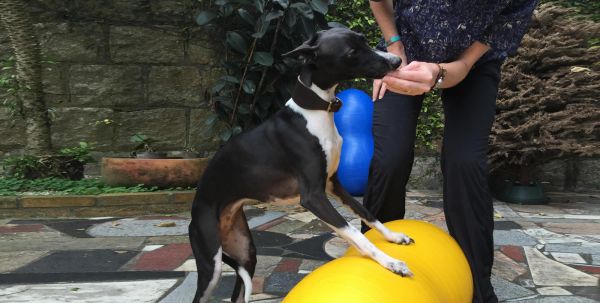
Fitness and Conditioning

Whether your pet is a finely tuned athlete or an overweight couch potato, they could benefit from a fitness and conditioning exercise programme.
Fitness and conditioning is important in working dogs, dogs who love trail running and hiking Hong Kong’s great country park trails, dogs that love swimming off our fabulous beaches, and even all the ‘non-competitive’ athletes, who spends their weekends playing with their mates at the dog park.
A common misconception about physical therapy for pets is that it is only necessary after an injury has occurred. Just as an athlete sees their trainer, physiotherapist or podiatrist to prevent injury; so too should our canine athletes who are exposed to similar stresses as they place heavy demands on their musculoskeletal system during their work and play.
Of course, we never know when an injury will occur, but it is always best to prevent injury or identify small problems before they progress. Monitoring for pain and osteoarthritis is wise in any pet.
Old age is not a disease and aging athletes will continue to benefit from exercise. Many working dogs reach age ten or older before retiring. However, seniors may develop other health conditions, including arthritis, heart disease or diabetes, which may require adjustments in their exercise program or activity. Sporting events often offer different levels of competition to allow seniors to participate at lower levels of stress or impact.
Osteoarthritis management programs designed to treat the condition in the early stages will help pets remain active longer. Pain scoring as a vital sign is also an essential aspect of monitoring any veterinary patient, especially the aging canine athlete.
Common sporting injuries include:
Working dogs, such as Scent detection, Search and rescue dogs and Guide or Assistance dogs all have vastly different requirements and fitness needs. What they do have in common is a need to stay healthy and injury free, which can be difficult in light of their often-strenuous activity.
By considering the type of injuries an animal could be exposed to with their lifestyle, we can tailor conditioning programmes to strengthen weak areas and prevent injury, as well as manage it.

A tailored therapeutic exercise programme is designed by Paws in Motion’s veterinary therapist to be muscle-specific and comprehensive to ensure it meets your individual pet’s needs. To prevent re-injury, pre-exercise stretching is key. Various training equipment is utilised to match your pet’s needs and ability.
More About Therapeutic Exercise
Many specialised ‘hands-on’ techniques are used by our veterinary therapists to assess and treat joints, soft tissue abnormalities & muscles tightness. A regular routine of stretching and massage with a focus on known areas of stress can be very beneficial to ensure your pet’s continued fitness. Therapeutic massage is also used to treat muscle tension and tightness.
More about Manual Therapy
Thermal therapy is the application of hot or cold elements to the body for the relief of pain and control of inflammation and swelling.
More about Thermal Therapy
Digital infrared thermal imaging with Digatherm helps us to visualise the pain and inflammation with a non-invasive physiological body scan that evaluates your pet’s circulation, neurological and musculoskeletal function. Thermal imaging is not a diagnosis, but a step to help us to target our treatments and identify overuse injuries in active pets.
More about Digatherm
Joint supplements with key ingredients of glucosamine, chondroitin and Omega-3 fatty acids, such as those available in bioactive green lipped muscle and deer velvet, can help to repair damage to the cells in the body and are extremely useful in improving joint health and comfort as well as helping to protect the joint structures from wear and tear.
Buy Joint SupplementsOur process for neurological disorders such as spinal problems
Initially we need to collect as much information as possible about your pet and your concerns; we will send you a detailed online questionnaire to complete. We will also reach out to your family veterinarian and /or specialist for your pet’s full medical history.
At our physiotherapy initial consultation, we assess the gait and movement of your pet, review their medical history and perform a thorough physical assessment to understand individual requirements and fitness needs.
Working together with you, we then tailor a conditioning programme which meets the needs and goals of your individual pet. The programme will generally include a variety of therapies and home care for you to continue at home, alongside our treatments.
We are here to support your pet’s fitness journey, as much or as little as you need us. Online consultations and video reviews can help to keep you on the right path.
"Dee will have many more years to enjoy his hiking."
"Paws in Motion have been the most massive help, educating me as an owner on how I can make life better for my dogs as they age, providing practical home based tips for improvement and offering fantastic client support when questions arise."
HK$ 530
HK$ 490
HK$ 600

